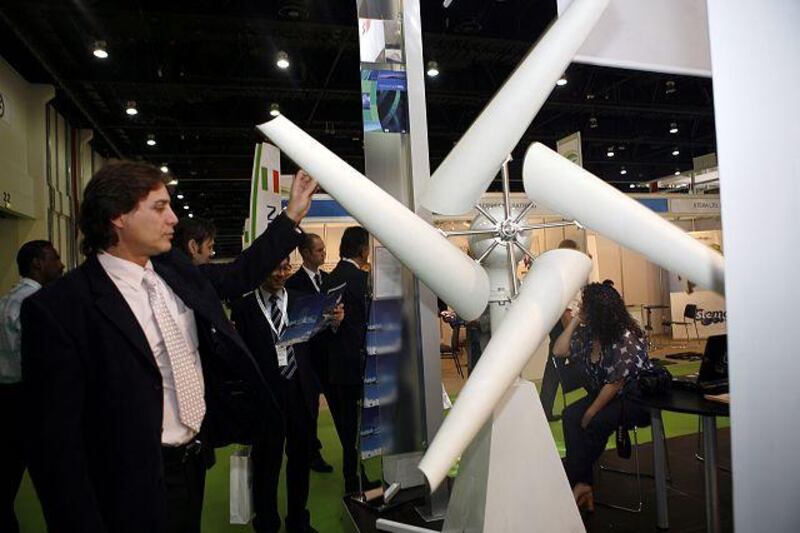Renewable energy firms are reeling from the end of an investment bubble that would have burst even without the added pressure of the global financial crisis, venture capitalists say. The dearth of funding will leave an important role to Masdar, the alternative energy investment firm launched by Mubadala Development, and other government-backed funds to provide financing to the sector until banks and private equity firms recover, according to bankers at last week's World Future Energy Summit in Abu Dhabi.
The drying up of capital for start-ups in the sector has been compounded by a tight market for project finance, which is commonly used to fund commercial implementation of renewable technology, such as wind and solar farms, bankers say. As interest in renewable energy has grown in recent years, money poured into the sector, offering capital to start-up firms with weak fundamentals, says Mike Goguen, a managing partner at Sequoia, a California venture capital fund.
"My guess is even if we hadn't had such a dramatic global market crash, just by natural economic forces we probably would have had a peaking of that investment bubble," he says. The total volume of investment in the clean technology sector grew by close to 60 per cent each year between 2004 and 2007, according to estimates by New Energy Finance. Last year, investment in the sector totalled US$155 billion (Dh569.31bn), or 10 per cent of total energy investment.
But growth slowed to 5 per cent last year, and will probably slow even more this year, the company says. Several prominent firms, including biofuels makers in the US, have suspended operations and made workers redundant. Wind farms are also under threat. Masdar officials said this week that they were reviewing the economics of the offshore London Array wind farm in the southern UK before proceeding.
Mr Goguen says it will take several more months for the true cost of the credit crunch on renewables to reveal itself. During the boom times, firms developing capital-intensive technologies demanded increasing volumes of investment to take their technology from the laboratory to commercial production, just as signs were forming of an approaching financial crisis, he says. "Only a few years ago, all that you heard on the panels that I was on... would be that all the rules you thought you knew in investing, throw them out the window because clean technology is different. We didn't really buy that."
It will take a while, but ultimately the credit crunch will lead to a more stable market, he says. "When there is enthusiasm about a particular cycle, fortunately or unfortunately, enthusiasm means lots of dollars pour in and companies get started," he says. "There is a correction, and the strong survive, so it's fairly Darwinian, and not necessarily unhealthy." But venture capital is only half of the equation. Buyers of renewable technology, including public utilities and private power firms, need access to billions of dollars of project finance to implement the technology on a commercial scale.
Project finance will be hard to find this year, says Patrick Blanchard, the global head of project finance at Dexia, a French bank. Wind and solar projects generally carry little more risk than traditional power stations, he says, but the problem was that interbank lending had frozen.. "Larger transactions are difficult, or frankly impossible, in the near future. Volumes have been dwindling, starting early in 2008."
Mr Blanchard says he is "pessimistic" on the outlook for project finance for this year. In the interim, companies such as Masdar will play an important role in funding renewable energy and in helping firms get their technology to the market, says Jeffrey Culpepper, the vice chairman for the investment banking department at Credit Suisse, which is a co-investor in the $250 million Masdar Clean Tech Fund.
"I just came off a panel full of people with great ideas, and I'm sitting there thinking, not one of those ideas is commercially out on the market," he says. "The role of banks is to take it out of the realm of possibility and put it in the realm of practical, day-to-day use." Mr Culpepper says renewable energy remains attractive to big international banks. "We can't fix the global crisis of confidence in mortgages, but there are things which we can fix, which is investing in the future. Long-term, what we are investing in today is going to pay off in spades in the future."
cstanton@thenational.ae





